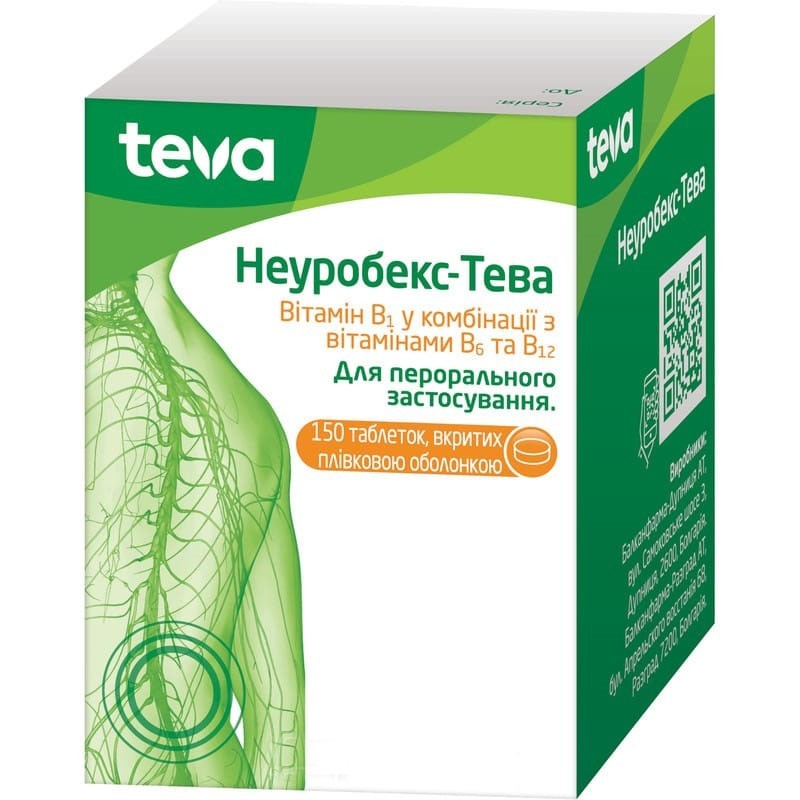



 Secure and encrypted payment processing
Secure and encrypted payment processing We ship to over 40 countries including the USA, UK, Europe, Australia and Japan
We ship to over 40 countries including the USA, UK, Europe, Australia and Japan Guaranteed refund or reship if you haven't received your order
Guaranteed refund or reship if you haven't received your orderNeurobex-Teva tablets are used in the complex treatment of neuritis, polyneuritis and neuralgia, such as:
One tablet contains (active ingredients):
Excipients: lactose monohydrate, wheat starch, talc, magnesium stearate, colloidal silicon dioxide, povidone, Kollicoat Protect, titanium dioxide (E 171), ponso 4R (E 124).
"Neurobex-Teva" to apply inside during or after food, without chewing, washing down with water.
Adults prescribe 2-3 tablets 3-4 times a day for 30 days.
The individual dose and duration of treatment is determined by the doctor.
The drug should be prescribed only after a careful assessment of the ratio of benefits to the mother and the risk to the fetus, since there is insufficient data on the safety of the drug during pregnancy.
Vitamins B1, B6 and B12 are excreted in breast milk. High concentrations of vitamin B6 can inhibit lactation. Studies on the degree of secretion of vitamins into breast milk have not been carried out. The decision to stop breastfeeding or to use the drug must be made taking into account the need to use the drug for the mother. If necessary, the use of the drug should stop breast-feeding for this period.
Medication should not be prescribed to children.
The drug does not affect the ability to drive vehicles or work with complex mechanisms. If dizziness is observed during treatment, one should refrain from driving vehicles and working with mechanisms.
In case of an overdose, there is an increase in adverse reactions associated with the use of the drug. Perhaps the appearance of nervous excitement, tachycardia, pain in the heart.
Vitamin B1 has a wide therapeutic range. Very high doses (more than 10 g) exhibit a curariform effect, suppressing the conduction of nerve impulses.
Vitamin B6 has a very low toxicity. Long-term use (more than 6-12 months) in doses of more than 50 mg of vitamin B6 daily can lead to peripheral sensory neuropathy. Excessive use of vitamin B6 in doses of more than one g per day for several months can lead to neurotoxic effects. Neuropathies with ataxia and sensitivity disorders, cerebral seizures with changes in the EEG, as well as in some cases hypochromic anemia and seborrheic dermatitis were described after the administration of vitamin B6 more than 2 g per day.
Vitamin B12: after parenteral administration (in rare cases, after oral administration), allergic reactions, eczematous skin disorders and a benign form of acne were observed over the recommended doses of the drug. With prolonged use of vitamin B12 in high doses, a violation of the activity of liver enzymes, pain in the heart, and hypercoagulation are possible.
Gastric lavage, intake of activated charcoal and symptomatic agents. Isoniazid is used as an antidote to vitamin B6.
When taking the drug, side effects are unlikely. In some cases, when taking the drug in this dosage form, the following side effects are possible.
From the nervous system: prolonged use (more than 6-12 months) in doses of more than 50 mg of vitamin B6 daily can lead to peripheral sensory neuropathy, nervous excitement, malaise, dizziness, headache.
From the digestive tract: gastrointestinal disorders, including nausea, vomiting, diarrhea, abdominal pain, increased acidity of gastric juice.
On the part of the immune system: hypersensitivity reactions, excessive sweating, shortness of breath, anaphylactic shock, anaphylactic shock.
From the endocrine system: high concentrations of vitamin B6 can inhibit lactation.
From the cardiovascular system: tachycardia, collapse.
On the part of the skin: allergic reactions, including pruritus, rash, urticaria.
Store at a temperature not exceeding 25 ° C, out of the reach of children, dry and protected from light.
Shelf life is 2 years.